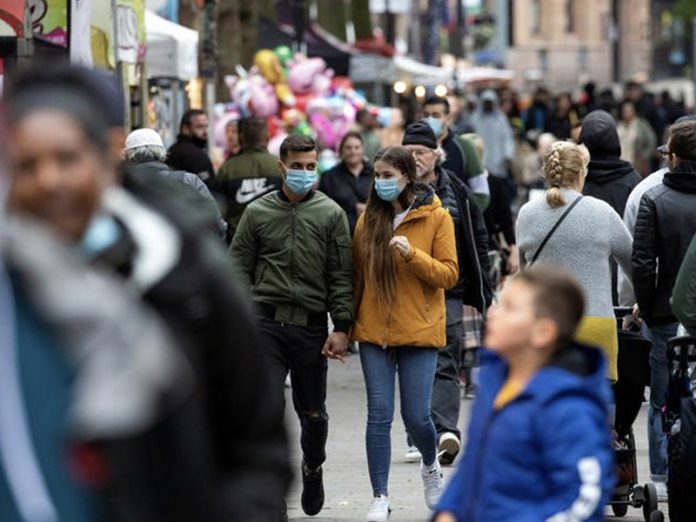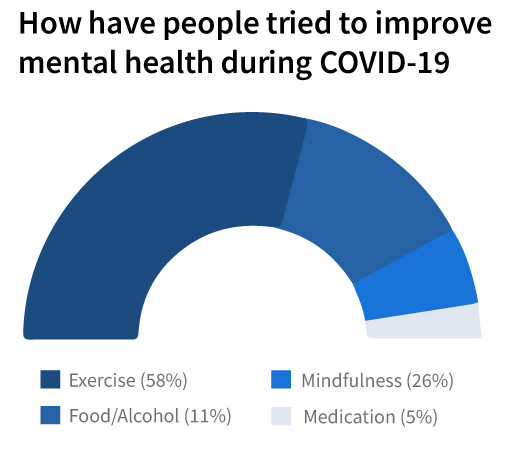By Ben Hogg
As parts of Europe plunged into a new wave of national lockdowns, the UK is seeing restrictions ease this month, with individuals and businesses alike adjusting once more to new rules and regulations. The rollercoaster ride of the past year in COVID will undoubtedly bring permanent change to many of our behaviours, impacting our every way of life going forward.
From high street shopping to fitness and exercise, the pandemic has changed the way in which people go about their daily lives. With the over 50s now mostly vaccinated and COVID rates consistently falling, COVID is finally beginning to decline in the UK. Yet, the impact of the pandemic will affect us long after it is over. In this article, I will reflect upon the changes in human behaviour and consumer sentiment resulting from COVID and the potential ongoing impact on individuals and businesses alike.
COVID and Its Impact on Businesses
In the UK, the first consumer-facing businesses to re-open fully were retail premises. During the lockdown period, those retailers that had a robust online presence thrived, with both grocery and non-food online retailers reporting bumper profits. Lucid’s own research stated that 59% would return to grocery shopping in person, but with 85% of people saying that COVID has affected their shopping routines, retailers that remain conscious of these changes will be those likely to succeed post lockdown.
For many people COVID has inspired them to support local and independent businesses who were potentially less likely to remain afloat in times of crisis than large chain stores. Should this shopping behaviour continue post-COVID, it could have huge implications for local high street communities and shift spending patterns permanently.
The entertainment industry has arguably been one industry hit incredibly hard by COVID restrictions with cinemas, theatres and concert venues having been largely shut throughout the last year and no meaningful way to shift services online. Lucid’s research suggested that 31% would not visit a cinema post pandemic, suggesting there is still massive change afoot for the entertainment industry.
Yet, in contrast, home entertainment has seen a considerable increase in sales with 56% of people having purchased additional streaming services during COVID-19 and 50% of those people unlikely to cut back on streaming services post lockdown. It would appear that most people are happy to continue using home entertainment solutions in the long term – or at least until worries about COVID safety have been alleviated.
Entertainment experts suggest that streaming is the future of entertainment, not merely just a trend. As we the people become more comfortable and at ease with streaming content, the convenience and cost efficiency of watching films and TV programmes in the comfort of our home looks to be holding strong as the new norm.
COVID-related Health Trends
Of course, after a pandemic comes the inevitable threat that society is at risk of becoming a community of ‘home bodies’, happy to stay home and opt out of social activity and responsibility. But what impact does this have on our health and wellbeing?
Many have not visited their GP for fear of contracting COVID which will have concerning implications for the diagnosis and treatment of more serious conditions. This is supported by research by Cancer Research that states that there has been a decline of 50% of patients beginning treatment for cancer following a referral from cancer screening.
The effect on society’s mental health is also evident. Lucid’s research showed 55% of people admitting a decline in mental health as a direct result of COVID-19. The different coping strategies used by people also influence their spending habits with 58% of people said they had increased their exercise to help with mental health and 37% of people investing in specific online exercise programmes, 26% doing mindfulness and meditation practices and 11% turning to increased food and alcohol consumption.
How COVID Has Affected Our Behaviour
Conversely, or perhaps even as a result of COVID and deteriorating mental health, it seems that people are more determined than ever to keep doing the things they love.
Whilst 68% of people in our study believed that COVID-19 would have a lasting impact on how they use mass public transportation, over half said they were ‘likely’ or ‘very likely’ to fly somewhere this year. Perhaps the impact of our year in COVID on mental health has given people the chance to evaluate their lives and consider what is important to them – it would appear that travel abroad has been given priority over the commute to the office!
With many employees able to carry out their roles virtually, coupled with the lack of confidence in public transport, it is likely that businesses will see a significant reduction in people working from their offices full time. Whilst this could have a huge impact on city infrastructure with potentially less need for permanent office space, and the corresponding reduction in food, retail and entertainment outlets necessary to support a smaller workforce – we could predict a boom for local high streets as people choose to stay at home more and spend money on the things that make them happy – retail, hospitality and leisure and love. With 80% of people believing it’s possible to keep a new romantic connection alive during the pandemic and 63% of single people embracing online dating it is a truly positive reflection on Britain’s commitment to the positive in times of crisis.
COVID-19 has undoubtedly had a huge impact on businesses and individuals alike, as the restrictions ease and the vaccination programme continues, it seems that the British will embrace new opportunities for happiness by choosing to spend their time and money on the things they care for most. And of course by choosing to ‘keep calm and carry on’.
About the Author
 Ben Hogg is Managing Director, EMEA and APAC, for Lucid, where he provides the strategic and operational direction for the company’s sales and marketing initiatives. In this role, Ben is responsible for leading and managing Lucid’s sales, post-sales, and global marketing teams to drive further growth and support revenue expansion for the company. Ben’s career has spanned more than 20 years working across the online market research and passive measurement industries as a leader and entrepreneur. He is an expert in identifying new market opportunities and in laying the foundations for long-term business growth through his strategic direction, operational execution, and team management.
Ben Hogg is Managing Director, EMEA and APAC, for Lucid, where he provides the strategic and operational direction for the company’s sales and marketing initiatives. In this role, Ben is responsible for leading and managing Lucid’s sales, post-sales, and global marketing teams to drive further growth and support revenue expansion for the company. Ben’s career has spanned more than 20 years working across the online market research and passive measurement industries as a leader and entrepreneur. He is an expert in identifying new market opportunities and in laying the foundations for long-term business growth through his strategic direction, operational execution, and team management.
Prior to Lucid, Ben was the MD, EMEA for Research Now’s Portfolio Companies, following their acquisition by e-Rewards, where he was responsible for launching their European business in 2006. Ben is a Fellow of the Market Research Society (MRS), and MRS Accredited Company Partner Council Member, and MRS Award winner.
Disclaimer: This article contains sponsored marketing content. It is intended for promotional purposes and should not be considered as an endorsement or recommendation by our website. Readers are encouraged to conduct their own research and exercise their own judgment before making any decisions based on the information provided in this article.





































